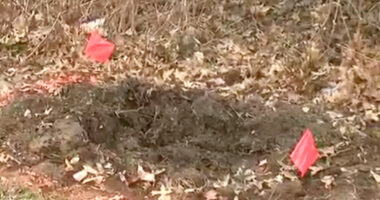Share this @internewscast.com
More than 26 years have passed since a young girl from North Carolina mysteriously disappeared, leaving many questions unanswered.
In 2000, Asha Degree was last observed being ushered into a 1970s green Lincoln Thunderbird or a similar model near her Shelby home. To generate fresh leads, the FBI and the State Bureau of Investigation have recently boosted the reward for information leading to her whereabouts, lifting it to a substantial $100,000.
This increase came shortly after authorities conducted searches at abandoned buildings in Lincoln County. These properties once belonged to 80-year-old Roy Dedmon, a suspect in this ongoing mystery. A prior search in September 2024 covered five properties across Cleveland, Lincoln, and Mecklenburg counties. As reported by WCNC, investigators focused on a home and an AMC Rambler that might be connected to Asha’s disappearance.
In 2001, some of Asha’s belongings were found in double-bagged garbage along Highway 18 in Burke County. Among the items was an undershirt containing a hair stem sample, which drew significant attention.
DNA evidence from two items in Asha’s backpack was linked to AnnaLee Dedmon Ramirez and Russell Underhill. Dedmon Ramirez, the daughter of Roy and Connie Dedmon, was just 13 when Asha disappeared. The Dedmons also have other daughters, Lizzie Dedmon Foster, who was 16 at the time, and her younger sister, Sarah Dedmon.
Russell Underhill resided at two properties owned by Roy and Connie Dedmon when Asha went missing. Underhill passed away in 2004.
The September 2024 search occurred the same month a man allegedly told Cleveland County police that he attended a house party in the mid-2000s with Dedmon Foster and Sarah Dedmon. He claimed Dedmon Foster was intoxicated and crying when she said, “I killed Asha Degree” — leading her younger sister to grab her head and tell her to “shut the f**k up.”
Reports indicated that Connie Dedmon and their three daughters were also named as suspects.
The man reportedly passed a polygraph test regarding his statements to Cleveland County police. Dedmon Foster initially refused to speak to investigators, but she did take a polygraph test. According to the Shelby Star, the test determined she was being deceptive about concealing information in Degree’s case.
Sarah reportedly told police she would take a polygraph test at a later date. At some point, she allegedly told police that her father gave her a vehicle resembling the one Degree was last seen in.
Weeks earlier, police obtained a search warrant for Dedmon Foster iCloud account. Detectives said they had discovered messages in which she and Sarah Dedmon talked about a shirt.
“They think it’s our shirt. It’s not her shirt,” Sarah allegedly wrote. “Dad is probably going to be a huge suspect.”
In documents, police indicated that the text messages may be evidence of felony obstruction. They also stated that if the three Dedmon girls abducted and killed Degree, assistance from their parents was “necessary in the execution and/or concealment of the crime.”
Last July, Skip Foster, a spokesperson for the Dedmon family, denied allegations that they were involved in Degree’s suspected abduction. He said the AMC Rambler which Cleveland County investigators said is connected to the case was not registered or titled to the Dedmons until a month after Degree’s disappearance.
“There’s a courtroom — and then there’s the courtroom of public opinion,” Foster told WCNC. “And there’s only been one side of this story told.”
Degree, who would be 35 today, was described as standing 4 feet, 6 inches tall, weighing 65 pounds, and having brown hair and brown eyes. Anyone with information regarding this case is asked to call Cleveland County police at 704-484-4888.
Asha Degree’s case is being covered as part of Crime Online’s “Finding the Lost: Black and Missing” series, which will feature a missing Black person every day in February. The full series can be read here.

















